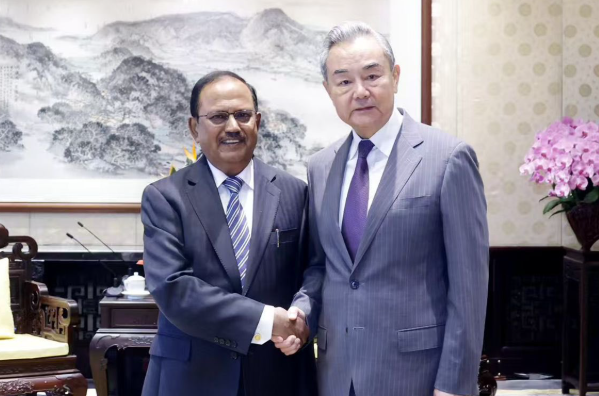Indian NSA Ajit Doval Meets Chinese Foreign Minister Wang Yi:India’s National Security Adviser Ajit Doval meets Chinese Foreign Minister Wang Yi in Beijing during the SCO Security Council Secretaries’ meeting. The two leaders discussed counterterrorism, border issues, and ways to normalize India-China relations after years of tension. The visit also coincides with the resumption of the Kailash Mansarovar Yatra and upcoming high-level SCO meetings.
Indian NSA Ajit Doval Meets Chinese Foreign Minister Wang Yi in Beijing Amid Renewed Talks
In a significant development for regional diplomacy, India’s National Security Adviser (NSA) Ajit Doval is currently in China to attend the 20th meeting of the Shanghai Cooperation Organization (SCO) Security Council Secretaries. This crucial meeting comes at a pivotal moment as both nations attempt to reset ties after years of strained relations.
During his visit to Beijing, NSA Doval met with Chinese State Councillor and Foreign Minister Wang Yi. The high-level discussions underscored the importance of cooperation between the two Asian giants. Doval emphasized the need to jointly counter terrorism in all its forms and manifestations, which remains a critical concern for maintaining peace and stability across the region.
This meeting marked the first direct dialogue between the two since the tense military standoff between India and Pakistan following the Pahalgam terror attack, which had broader regional implications.
According to India’s Ministry of External Affairs (MEA), both sides conducted a comprehensive review of recent developments in India-China bilateral relations. They highlighted the shared necessity of promoting the overall development of ties between New Delhi and Beijing. NSA Doval extended an invitation to Wang Yi to visit New Delhi, suggesting the willingness of both parties to engage in further dialogue aimed at resolving the long-standing and sensitive border dispute.
Doval’s visit also includes bilateral discussions with several other key counterparts from Russia and Central Asian SCO member states. These interactions are crucial as the SCO continues to evolve as a platform for regional cooperation on security, economic, and political issues.
The current SCO meeting of security council secretaries is seen as a preparatory stage for the upcoming SCO foreign ministers’ meeting in July, which will be attended by India’s External Affairs Minister Dr. S. Jaishankar.
Adding another layer to this week’s diplomatic activity, Indian Defence Minister Rajnath Singh is also scheduled to travel to China for the SCO Defence Ministers’ meeting. He is expected to hold discussions with his Chinese counterpart and other defence leaders from the region, further strengthening multilateral engagement through the SCO framework. Given that China is hosting these SCO meetings, these high-level visits reflect the careful efforts being made to manage and advance the complex India-China relationship.
Interestingly, these developments coincide with the resumption of the Kailash Mansarovar Yatra, as the first batch of Indian pilgrims has reached the sacred site. The pilgrimage, which had been suspended amid previous tensions, symbolizes a broader effort to restore people-to-people connections and cultural ties between the two nations.
The resumption of the Yatra was part of a six-point consensus reached during Ajit Doval’s last visit to Beijing in December. Other measures from that agreement include enhanced cooperation on trans-border rivers, the reopening of the Nathu La border trade route, and discussions on resuming direct flights between India and China.
This week’s high-level engagements build upon the momentum generated after the informal meeting between Indian Prime Minister Narendra Modi and Chinese President Xi Jinping on the sidelines of the Kazan BRICS summit last year. That meeting marked a turning point, with both sides expressing a renewed commitment to stabilizing ties after nearly five years of tensions.
As these meetings unfold, observers anticipate further positive developments that could pave the way for a gradual normalization of India-China relations. The current diplomatic exchanges reflect not only a desire to manage bilateral differences but also to strengthen multilateral cooperation in an increasingly complex global environment.
With multiple high-level visits, comprehensive dialogues, and the revival of cultural exchanges, this week could prove to be a defining chapter in the evolving relationship between India and China.
Disclaimer:
This content is for informational purposes only, based on media reports and public sources. The article does not intend to express any political opinion or official stance. Readers are advised to verify facts from official government releases for complete accuracy.

